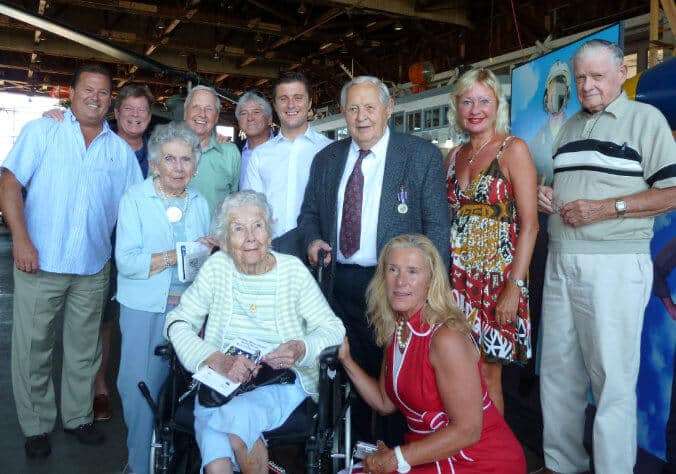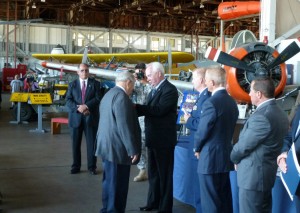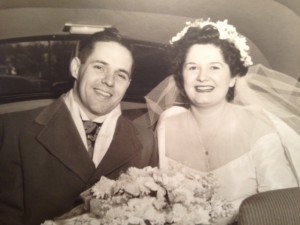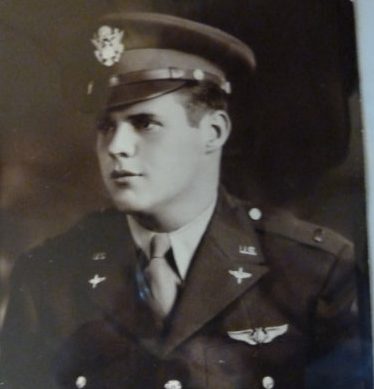“Time certainly changes the complexion of things very quickly – – it seems but a few months ago that Billy was only a little boy in knee-pants when I made some of my first visits to Philadelphia. He is grown up now; his development has been fast; he has grown beyond the stage of a hero among the kids – – he is now a hero among the people of a free America!”
These were the words written by Carl Sorby about 1st Lieutenant William C. Foster by letter dated December 7, 1943, to his friend and colleague William J. Foster, a/k/a Pop, father of Bill. Better words could not be chosen to describe Bill Foster, my father-in-law. I met Mr. Foster during the summer of 1976, shortly after being introduced to my wife Julia, by my good friend Dave Heary. Julia was like no woman (girl) I had ever met – in so many wonderful ways. But this is not about Julia – it’s about her father and by definition her mother (Bunch) as well. From day one, it was obvious Bill was a special person, a good person, someone to look up to. He is far more than a sports hero or a war hero – – he is truly a family hero.
The words spoken by Carl Sorby were in admiration for a young man who had flown 54 missions as a B-17 and B-24 bombardier, primarily over Guadalcanal, forcing the Japanese from the region. He was awarded the Distinguished Flying Cross with two Oak Leaf Clusters and the Air Medal with three Oak Leaf Clusters.
But the story begins long before the campaign on Guadalcanal. It began with that infamous day of December 7, 1941, and the Japanese attack upon Pearl Harbor. Bill, a college student and football player for Lehigh University had transferred to Villanova University at the time of the attack. Within days of hearing the radio transmission of the stunning news which electrified the nation, he advised his parents he had decided to defer his college education to enlist in the United States Army Air Forces. His enlistment was not for fame or even for recognition, but because he felt it “the right thing to do”. And so it was that he, along with hundreds of other young men, deferred college; postponed or accelerated marriage; or otherwise changed best laid plans to March to War. Tom Brokaw, in his book, THE GREATEST GENERATION, states,
“The young Americans of this time constituted a generation birthmarked for greatness…It is a generation of towering achievement and modest demeanor, a legacy of their formative years when they were participants in and witness to sacrifices of the highest order. They know how many of the best of their generation didn’t make it to their early twenties, how many brilliant scientists, teachers, spiritual and business leaders, politicians and artists, were lost in the ravages of the greatest war the world has seen”.
Having made his decision, Bill’s first assignment was Maxwell Field in Montgomery, Alabama, where he began pilot training. Prior to being selected, he underwent rigorous physical and mental testing and was one of only two men chosen from over 100 candidates from Philadelphia. He continued pilot training in Georgia before being deployed back to Alabama to await admission to the Aerial Bombardier Program at the Midland Army Flying School at Midland, Texas. On July 2, 1942, Aviation Cadet Foster received his wings as a Bombardier and was commissioned a Second Lieutenant in the United States Army Air Forces.
In correspondence from Brigadier General Isaiah Davis, Commander at Midland, he advised Bill’s parents,
“I want to take this opportunity to tell you that you have every reason to be proud of your son’s record at Midland Army Flying School, the world’s largest Bombardier College.
I would like to emphasize, too, that this is far more than a routine graduation. For one thing, it means that your son has lived up to the promise he showed when he classified for Bombardier training. You may be interested to know that only about 15 percent of the Aviation Cadets applying for aircrew training can meet the very exacting requirements of the Bombardier course – – and not all of those classified complete the course.
The position of the Bombardier in modern aerial strategy is one of unique and prime importance. A Bombardier Officer must possess the utmost in mental and physical alertness, moral courage and complete trustworthiness. Your son’s instructors tell me that he measures up to these qualifications. That is why we have entrusted to him the secret of the famous United States bombsight, one of the world’s most valuable military weapons.
That is why we are graduating him and looking to him and his classmates to help us deliver the knock-out punch to the enemy.”
After graduating from Advanced Flying School, Bill was sent to Hendricks Field, Florida, where he received a diploma from the Army Air Forces Combat Crew School on August 14, 1942. His B-17 crew was then assigned to submarine patrol off the coast of Florida in search of one and two man occupied Nazi submarines. Interestingly enough, although Bill was not responsible for sinking any of the enemy subs, he did have a direct hit on a whale – – oops!
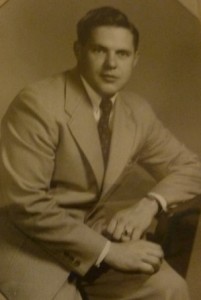
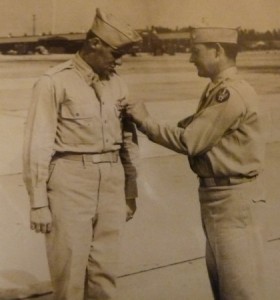
In anticipation of eventual deployment outside of the United States, he continued training missions in Colorado, Utah, and Cuba. In December 1942, his B-24 crew left the States for Guadalcanal and the neighboring islands in the Pacific Theater. It was the first major offensive by allied forces against the Empire of Japan. By February 1943, in the face of the allied offensive, the Japanese conceded Henderson Field, as well as Guadalcanal and the surrounding islands. The Guadalcanal campaign was a significant strategic victory marking the transition by the allies from defensive operations to offensive operations including the Solomon Islands, New Guinea, and the Central Pacific. The campaign resulted in Japan’s eventual surrender and the end of World War II. Bill and his crew flew 54 missions during the Pacific campaign over approximately 18 months. Most notably, Bill and his crew were responsible for dropping the first bombs on Guadalcanal from their B-24 bomber nicknamed “The Eager Beaver”. The crew was rewarded with well-earned rest and relaxation in Auckland, New Zealand.
In May of 1944, Bill was one of ten War Heros to receive awards for Valiant Deeds. In a ceremony at Chatham Field in Savannah, Georgia, he was awarded the Distinguished Flying Cross and one Oak Leaf Cluster by Colonel Robert T. Coronau, Commanding Officer. He was specifically cited for his accomplishments which included 30 bomber strike sorties during the month of September 1943 alone.
Upon his return to the States and assignment to Chatham Field, Bill played football for the Chatham Field Blockbusters. In a game played on October 26, 1944, against the University of Pittsburgh football team, the Savannah Evening Press had this to say, “Take your field glasses with you. Focus them on No. 80, a squat young man who will be playing one of the guard positions. He is Lt. Bill Foster, who is at home in both B17’s and B24’s, and if the going gets a trifle rugged in the neighborhood of his sector of the scrimmage line, I doubt if the Lieutenant will shiver in his shoes. You see, he is lately back from 54 missions in the South Pacific. He has the Air Medal and the Distinguished Flying Cross, with clusters. Lt. Foster has been up to his neck in a game in which the opponents recover all the fumbles.”
On July 2, 1945, Bill was commissioned a First Lieutenant, Air Corps. Upon the conclusion of the war, he remained a commissioned officer until the time of his discharge and return to home in the Mt. Airy section of Philadelphia.
On Thursday, August 16, 2012, some 70 years after enlisting to fight a former painter who had seized control of the National Socialist German Workers Party (Nazis) and the Imperialist Japanese Empire, our FAMILY HERO was awarded the Distinguished Service Medal with Silver Oak Leaf Cluster. It was an honor to be present and witness my father-in-law receiving the recognition he so earned.

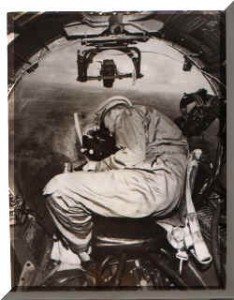

The medal ceremony was sponsored by the NJ Department of Military Affairs and the medal was awarded in recognition of Bill’s combat service. He also received Gubernatorial and Special Congressional Citations of Recognition. Fittingly, the ceremony was held at the Naval Air Station Wildwood, and was presided over by NJ State Senator, Jeff Van Drew, Assemblymen Nelson Albano and Matt Milam, and various military dignitaries. The ceremony took place in historic Hangar 1, honoring 30 war veterans including 7 from World War II. Bill was the most senior officer of those honored.
NAS WILDWOOD was a WWII dive bomber training center for aviators. Forty-two airmen perished during training between 1943 and 1945 as the result of 129 crashes. October 1944 saw peak activity at NASW with 16,994 take-offs and landings in a single month. Hangar 1 is now an aviation museum containing 26 aircraft displays, as well as exhibits of military memorabilia in honor of the 42 airmen who were killed during training. The ceremony took place on a beautiful sunny day in Wildwood with Bill’s wife Bunch (64 years married) at his side, along with his two brothers Bob and Joe, sister-in-law Mary, son Bill, and various nieces, nephews, in-laws, friends and other family members.
Bill is a graduate of LaSalle High School, Class of 1938, and also attended Pennington Prep in 1939 before entering Lehigh University. After the war, he returned to Villanova University and graduated in 1948 with an engineering degree.
Bill, now 92 years young, has completed five consecutive senior triathlons and can be found exercising daily at the Ocean City Aquatic Center where he can be heard leading a group of aquacisers in his vocal salute to America……
Off we go_____in-to the wild blue yon – der,
climb-ing high____ in-to the sun.___________
Here they come,____zoom-ing to meet our thun-der,
at ‘em boys,______ give ‘er the gun! (Give ‘er the gun now!)
Down we dive,____ spout-ing our flame from un-der,
off with one____ hell-uv-a roar!
We live____ in fame_____or go down_____in flame.
Shout! Noth-ing-’ll stop the Ar-my Air Corps!___
Minds of men_____fash-ioned a crate of thun-der,
sent it high_____in-to the blue._____________
Hands of men______blast-ed the world a – sun – der;
how they lived______God on-ly knew! (God on-ly knew them!)
Souls of men____ dream-ing of skies to con-quer
gave us wings,______ev-er to soar!___________
With scouts____ be-fore____and bomb – ers ga-lore,
Shout! Noth-ing-’ll stop the Ar-my Air Corps!___
Off we go_____in-to the wild sky yon-der,
keep the wings___lev-el and true.____________
If you’d live_____to be a gray – haired won – der
keep the nose_____out of the blue! (Out of the blue, boy!)
Fly-ing men, guard-ing the na-tions bor-der,
we’ll be there,______fol-lowed by more!______
In ech-e-lon ______ we car – ry one.
Shout! Noth-ing-’ll stop the Ar-my Air Corps!___
And nothing will stop Bill Foster. So Proud, so Pure. Your family and country love and salute you! Thank you for your courageous service.
